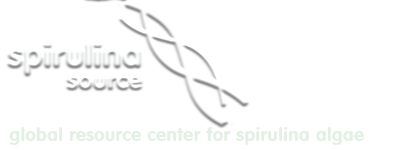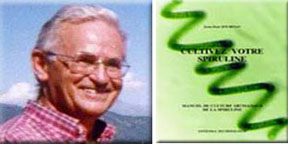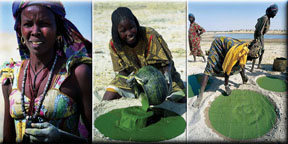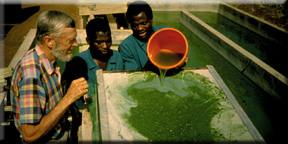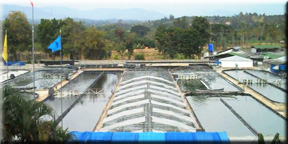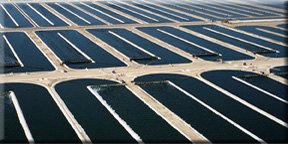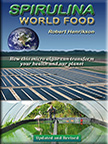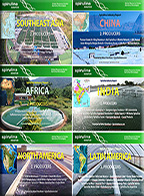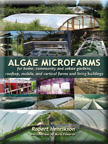Featured examples of Spirulina Production Systems
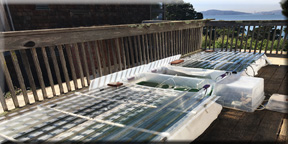 Spirulina Rooftop Microfarm in Point Richmond CA
Spirulina Rooftop Microfarm in Point Richmond CA
A small rooftop microfarm was installed in Point Richmond on San Francisco Bay in 2019, with a view of the Golden Gate. Designed for year round round production with insulation, heaters and second covers for the colder season. This location is close to San Francisco area markets, but this spirulina product is primarily intended for local customers.
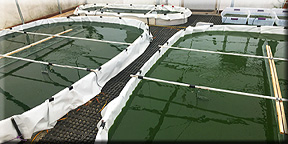 Spirulina Greenhouse on Treasure Island CA
Spirulina Greenhouse on Treasure Island CA
A spirulina greenhouse system was installed on Treasure Island in San Francisco Bay in 2019, the first spirulina microfarm in San Francisco county. Designed for year round round production with insulation, heaters and second covers for the colder season. This farm location is close to all the San Francisco, Oakland, Berkeley and Marin area markets.
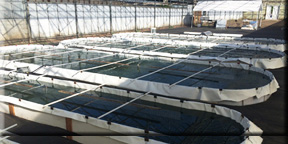 San Francisco Bay Area Microfarm
San Francisco Bay Area Microfarm
This first Northern California spirulina farm began in 2016 in Half Moon Bay inside a large commercial glass greenhouse. Producing an all-natural product in a controlled environment, using no pesticides, herbicides or fungicides. The water source is Half Moon Bay city water, carbon filtered. Designed for year-round production with insulation, heaters and second covers for the colder season.
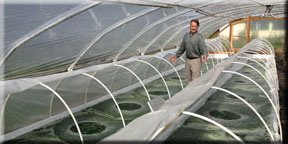 Smart Microfarms in Washington State
Smart Microfarms in Washington State
As one of the northern most spirulina farms, this facility demonstrated the capability of algae microfarms in cooler climates and tested practical and affordable microfarms for growing algae for local food and high value products in urban, community, rooftop, mobile and vertical gardens. See slideshow.
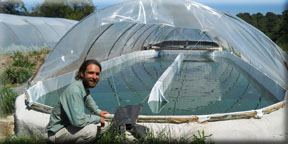 An integrated spirulina algae microfarm in France
An integrated spirulina algae microfarm in France
EcoDomaine Ferme de Bouquetot is located 3 km from the Normandy Coast. Laurent Lesesve introduces this experimental integrated farm with four 50 m2 algae ponds. One pond is grown on organic nutrients from a biogas digestor. Ponds are heated, covered and insulated to retain warmth. July 2011.
At his greenhouse in the South of France, Jean Paul Jourdan demonstrated how he grows, harvests and dries spirulina, producing a tasty food product. For many years he developed small scale algae projects in Africa. In his guide “Grow Your Own Spirulina“, he describes how to cultivate on a family scale.
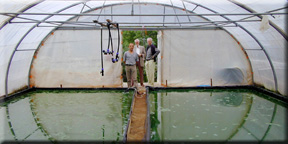 Family and community farms in France
Family and community farms in France
After several years working at spirulina farms around the world, Philippe Calamand built two greenhouses with a pond area of about 135 square meters at his homestead, producing about thirty 200gm packages per day. Local demand for Spiruline La Capitelle noodles exceeded capacity.
For many generations, Kanembu women have passed from mother to daughter the traditional methods of harvesting spirulina from Lake Boudou Andja in Chad to make dihé. Producing more than 250 dry tons per year, nearly the world’s highest volume and certainly lowest cost producers of spirulina.
An appropriate technology project developed by Dr. Ripley D. Fox in the village of Farende, Togo. The design for the Integrated Health and Energy System won the prestigious 1987 European Award for Appropriate Environmental Technology, sponsored by the EEC and the UN Environmental Program.
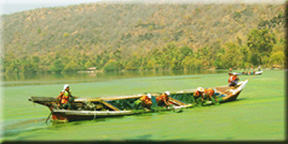 Lake and pond harvest in Myanmar
Lake and pond harvest in Myanmar
June Pharmaceuticals is one of the world’s largest producers of spirulina from both natural lakes and production ponds. The company produces about 200 tons of spirulina per year and offers a variety of innovative products including food supplements, beverages, extracts, cosmetics, personal care products, herbal products, biofertilizer and spirulina beer.
Boonsom Spirulina Farm near Chiang Mai is the largest in Thailand, with 40,000 square meters of growing pond area, and is ISO 22000 Certified. The pioneering founders are Professors Jiamjit Boonsom and Somchye Boonsom. Here you can learn how spirulina algae is grown, harvested and made into finished products.
In 1981, Earthrise Nutritionals was established in Imperial Valley as the first commercial spiruliana farm in the USA. Over the next decade the farm expanded to cover 108 acres. By the mid 1990’s Earthrise had achieved the world’s largest production of 500 tons per year. Today, Earthrise Nutritionals is owned by Dainippon Ink & Chemicals. Here are archival videos from 1983, 1994 and 1996.
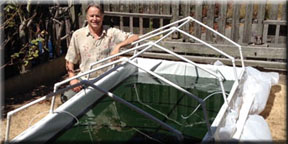 Smart Microfarms in California
Smart Microfarms in California
In Richmond, California, by San Francisco Bay, Smart Microfarms, has been developing a series of simple scalable platforms. Featuring several home growing systems for spirulina: indoor aquariums, outdoor deck growing modules, and a 4×8 backyard micro pond which is scalable to a community greenhouse.
